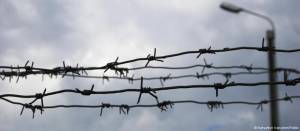What will become of prison colonies in the military zone?

Oleksandr Bukalov from Donetsk Memorial reports on the general trend towards a reduction in prisoners in Ukraine and to the difficult situation regarding prison colonies in the Donetsk and Luhansk oblasts.
The number of prisoners in Ukraine is continuing to fall. As of Nov 1 2014, there were 177 Penitentiary Service institutions with 84, 663 prisoners (against 90, 882 the previous month). This means that there are now 197 prisoners for 100 thousand head of population against 212 a month ago and 279 on Jan 1, 2014.
There are 16, 866 people in SIZO [pre-trial detention centres] as against 18, 071 a month ago. Of these 2, 091 are in fact at the pre-trial investigation stage (against 2, 017).
There are 67, 313 prisoners in penal institutions (against 72, 273) and a further 484 (against 538) in borstals.
There are 2, 974 women prisoners in 14 prison colonies (against 3, 182) and 1782 life prisoners [against 1906). 10.7 thousand people are serving sentences of over 10 years.
The statistics do not include those serving sentences in the Crimea.
The situation is very difficult in prison colonies in the Donetsk and Luhansk oblasts. Food is being provided, though with enormous difficulty, to institutions on territory which is not controlled by the Ukrainian forces. This may, however, change following the presidential decree on Nov 15 ordering all public sector institutions from territory under militant control. The same decree instructs the Justice Ministry to take urgent measures to move State Penitentiary Service bodies and institutions, convicted prisoners and people in SIZO from areas where the ‘anti-terrorist operation’ is under way to other regions of Ukraine. It also proposes amnestying prisoners convicted of crimes classified as of low or medium seriousness.
Bukalov notes, however, that it is unclear whether this applies to institutions on territory not controlled by the Ukrainian government.
http://ukrprison.org.ua/news/1417070408





